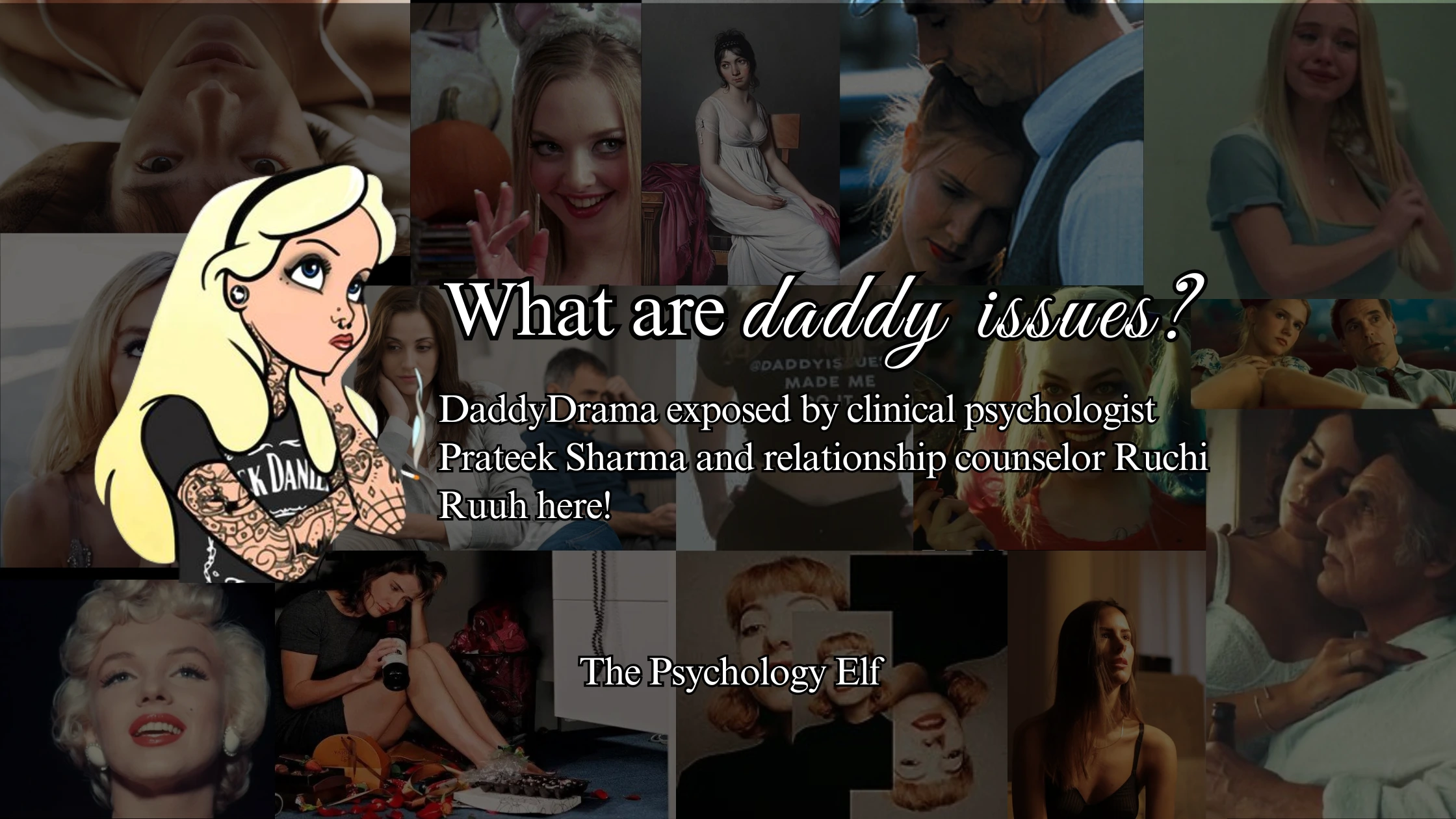Since you are active in the realms of social media and pop culture, the term “daddy issues” is probably not new to you. You must have heard someone saying things like, “Oh, she’s daddy issues,” or encountered the term in a song, or maybe stumbled upon a meme on the topic.
Sanjivani Pargal, 21, a psychology student, recalls first hearing the term “daddy issues” on Instagram and within her college circle, where it was used as slang. And well, Sanjivani’s college people aren’t the only ones who do so.
This social media slang term has transcended its origin to become a widely adopted term in various social circles. And this is why it needs a closer look.
Unpacking Daddy Issues

Have you ever paused to consider what daddy issues are exactly? If you think the term has something to do with having an unhealthy relationship with your father as a child and having it affect you in your adulthood— you are partially correct.
However, it’s better to have some more insight into the matter. “Daddy issues” is one of the most misused terms today, thanks to pop psychology, pop culture, and social media. And even though the term is said to be used for humorous purposes, it has caused more harm than good.
We have Prateek Sharma, a clinical psychologist, and Ruch Ruuh, a relationship counselor, to clear the air around the term and the topic.
The Origin & Lack Of Recognition in Mental Healthcare
Prateek starts by dismantling the term “daddy issues” within the mental health care field. According to Prateek, “Within the entire fraternity of psychiatry and psychology dedicated to providing legitimate mental healthcare to people, there is no such term (like daddy issues) that is used or should be used.”
He further adds, “Neither does there exist a term like daddy issues for that nor does it have any space in therapy (unless, of course, the person coming to therapy brings it up and has some association with it).”
But why, then, you might wonder, is this term so widely used if it lacks professional recognition? To this, Prateek says, “It emerges from the long tradition of overgeneralized and dehumanizing ideas about how people, largely women, have had difficulty navigating their adult relationships owing to the problems they have had with their parents.”
Role of Pop Culture & Social Media

According to Ruchi Ruuh, the usage of the term has been promoted by pop culture through social media, portrayal in TV, cinema, and music. She also notes that the usage of this term has both negative and positive aspects.
On one hand, the usage can bring attention to the importance of addressing issues related to family dynamics and relationships. On the other hand, she warns that it can oversimplify and stigmatize real emotional struggles that individuals may face.
Prateek, too, thinks that it’s not just pop culture but also the tsunami of influencers on social media lacking a legitimate background in psychology that contributes to the overall misuse. They oversimplify people’s histories and give a generalized explanation of their problems, which does absolutely nothing.
Ruchi explains that even though the term is trendy today, reaching the conclusion that someone has daddy issues isn’t straightforward. According to her, it’s a complex issue that can’t just be understood by a few signs and requires a more extended investigation into patterns and behaviors.
From “Daddy Issues” To Parental Wounds And Attachment Styles
These days, daddy issues are being equated to parental wounds. According to what is being said, “daddy issues” originate from having a troubled relationship with primary caregivers. There’s also new, extensive research establishing the link between insecure attachment styles and having “daddy issues.”
All of this can be pretty confusing. Because what are we to believe now? Are daddy issues nothing but parental wounds causing insecure attachment styles to develop?
Prateek addresses the confusion here by stating, “Every person I have ever met in the course of being a mental health professional has had relationship problems that have emerged from traumatic experiences that either have been very well-acknowledged like any form of abuse or have had imprints from trauma that are very subtle in nature, like attachment difficulties.”
He says, “I don’t think there is a criterion for identifying this except for the understanding and realization that something in your life is not going right for you, more specifically (considering the theme of your piece) your relationships.”
Are Daddy Issues A Women’s Thing?

Most people believe that having “daddy issues” is a women’s thing, as it is mainly used to refer to or describe women. But Prateek disagrees. He emphasizes that “Every individual belonging to any sect, gender, sexuality, ethnic background, or any coming from any social or cultural frame of the world can have difficulties with their parents or caregivers rooting back to the earliest of their relational interactions and dynamics which continue to express themselves in their current relational world.
To this, he adds, human beings operate in patterns. And so, these relational dynamics can often resurface, regardless of a person’s gender. But if we are to go by this, you might wonder how this term came to be specifically associated with women.
Media’s Influence on Daddy Issues
The kind of media we consume has normalized using the term so much that you might be wondering what all the fuss is about. A little bit of slang never hurt anybody, right? However, the normalization of “daddy issues” by the media needs to be put under scrutiny.
While this slang term seems harmless on the surface, the discomfort it causes individuals like Sanjivani can challenge the normalized usage.
Sanjivani remarks, “I don’t like the label personally. I have seen people use this term as a way to describe themselves or a friend humorously. But when we go around the terminology and figure out what this really means, or it intends to mean, then this joke is kinda messed up I feel…this labeling is something I don’t resonate with.”
Choosing Alternatives To Daddy Issues
Prateek urges against using the term “daddy issues” in everyday life and even close relationships. The term is derogatory and can alienate an individual from their identity.
Now, if “daddy issues” is such a problematic term, what else can one use, if need be? Prateek says, “There is also no other term that should substitute it other than something as common as “relationship problems,” “childhood trauma,” “attachment problem,” “parental problems,” or “parental wound.”
Concluding Thoughts
If you’ve read this far, it’s likely that plenty of notions that you had about “daddy issues” got challenged and, hopefully, changed. But, it is also possible that you didn’t find this article convincing enough.
Maybe you still resonate with the usage of this term. Maybe you still think that you or someone you know has something like daddy issues. After all, an influencer or an Instagram post said so.
Well, this is what Prateek has got to say about it: “It is saddening to see that the interpretation of something so private, deep, and complex becomes a stock of prejudice through the usage of such a term. These are problems that are navigated within the haven of a comfortable and adequate therapeutic relationship rather than being labeled as something like this and being given solutions to.”

